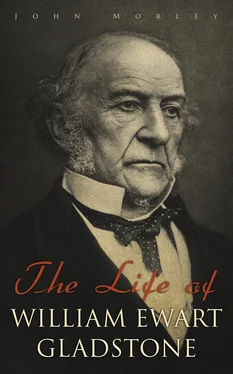10.The other sons and daughters of this marriage were Thomas, d. 1889; Robertson, d. 1875; John Neilson, d. 1863; Anne, d. 1829; Helen Jane, d. 1880.
11.At Dundee, Oct. 29, 1890.
12.In 1835 formal difficulties arose in connection with the purchase of a government annuity, and then he seems to have taken out letters patent authorising the change in the name.
13. Memoirs of J. R. Hope-Scott , ii. p. 290.
14.The story of John Smith is excellently told in Walpole (iii. p. 178), and in Miss Martineau's Hist. of the Peace (bk. II. ch. iv.). But Mr. Robbins has worked it out with diligence and precision in special reference to John Gladstone: Early Life , pp. 36-47.
15.Trevelyan's Macaulay , i. p. 111, where the reader will also find a fine passage from Macaulay's speech before the Anti-Slavery Society upon the matter—the first speech he ever made.
16.'A statement of facts connected with the present state of slavery in the British sugar and coffee colonies, and in the United States of America, together with a view of the present situation of the lower classes in the United Kingdom.'
17.In Demerara the average price of slaves from 1822 to 1830 had been £114, 11s. 5¼d. The rate of compensation per slave averaged £51, 17s. ½d., but it is of interest to note that the slaves on the Vreedenhoop estate were valued at £53, 15s. 6d.
18. Dict. Nat. Biog. , Sir James Carmichael Smyth.
19.He took Follett's opinion (Aug. 5, 1841) on the question of applying for a criminal information against the publisher of an article stating how many slaves had been worked to death on his father's plantations. The great advocate wisely recommended him to leave it alone.
20. Frankenstein was published in 1818.
21.House of Commons, April 27, 1866.
22. Letter to Dundas, with a sketch of a Negro Code , 1792. But see Life of W. Wilberforce , v. p. 157.
( 1821-1827 )
It is in her public schools and universities that the youth of England are, by a discipline which shallow judgments have sometimes attempted to undervalue, prepared for the duties of public life. There are rare and splendid exceptions, to be sure, but in my conscience I believe, that England would not be what she is without her system of public education, and that no other country can become what England is, without the advantages of such a system.—Canning.
It is difficult to discern the true dimensions of objects in that mirage which covers the studies of one's youth.—Gladstone.
In September 1821, the young Gladstone was sent to Eton. Life at Eton lasted over six years, until the Christmas of 1827. It impressed images that never faded, and left traces in heart and mind that the waves of time never effaced,—so profound is the early writing on our opening page. Canning's words at the head of our present chapter set forth a superstition that had a powerful hold on the English governing class of that day, and the new Etonian never shook it off. His attachment to Eton grew with the lapse of years; to him it was ever 'the queen of all schools.'
'I went,' he says, 'under the wing of my eldest brother, then in the upper division, and this helped my start and much mitigated the sense of isolation that attends the first launch at a public school.' The door of his dame's house looked down the Long Walk, while the windows looked into the very crowded churchyard: from this he never received the smallest inconvenience, though it was his custom (when master of the room) to sleep with his window open both summer and winter. The school, said the new scholar, has only about four hundred and ninety fellows in it, which was considered uncommonly small. He likes his tutor so much that he would not exchange him for any ten. He has various rows with Mrs. Shurey, his dame, and it is really a great shame the way they are fed. He and his brother have far the best room in the dame's house. His captain is very good-natured. Fighting is a favourite diversion, hardly a day passing without one, two, three, or even four more or less mortal combats.
MANNERS AT ETON
You will be glad to hear, he writes to his Highland aunt Johanna (November 13, 1821), of an instance of the highest and most honourable spirit in a highlander labouring under great disadvantages. His name is Macdonald (he once had a brother here remarkably clever, and a capital fighter). He is tough as iron, and about the strongest fellow in the school of his size. Being pushed out of his seat in school by a fellow of the name of Arthur, he airily asked him to give it him again, which being refused, with the additional insult that he might try what he could do to take it from him, Macdonald very properly took him at his word, and began to push him out of his seat. Arthur struck at him with all his might, and gave him so violent a blow that Macdonald was almost knocked backwards, but disdaining to take a blow from even a fellow much bigger than himself, he returned Arthur's blow with interest; they began to fight; after Macdonald had made him bleed at both his nose and his mouth, he finished the affair very triumphantly by knocking the arrogant Arthur backwards over the form without receiving a single blow of any consequence. He also labours under the additional disadvantage of being a new fellow, and of not knowing any one here. Arthur in a former battle put his finger out of joint, and as soon as it is recovered they are to have a regular battle in the playing fields.
Other encounters are described with equal zest, especially one where 'the honour of Liverpool was bravely sustained,' superior weight and size having such an advantage over toughness and strength, that the foe of Liverpool was too badly bruised and knocked about to appear in school. On another occasion, 'to the great joy' of the narrator, an oppidan vanquished a colleger, though the colleger fought so furiously that he put his fingers out of joint, and went back to the classic studies that soften manners, with a face broken and quite black. The Windsor and Slough coaches used to stop under the wall of the playing fields to watch these desperate affrays, and once at least in these times a boy was killed. With plenty of fighting went on plenty of flogging; for the headmaster was the redoubtable Dr. Keate, with whom the appointed instrument of moral regeneration in the childish soul was the birch rod; who on heroic occasions was known to have flogged over eighty boys on a single summer day; and whose one mellow regret in the evening of his life was that he had not flogged far more. Religious instruction, as we may suppose, was under these circumstances reduced to zero; there was no trace of the influence of the evangelical party, at that moment the most active of all the religious sections; and the ancient and pious munificence of Henry VI. now inspired a scene that was essentially little better than pagan, modified by an official church of England varnish. At Eton, Mr. Gladstone wrote of this period forty years after, 'the actual teaching of Christianity was all but dead, though happily none of its forms had been surrendered.' 23
Science even in its rudiments fared as ill as its eternal rival, theology. There was a mathematical master, but nobody learned anything from him, or took any notice of him. In his anxiety for position the unfortunate man asked Keate if he might wear a cap and gown. 'That's as you please,' said Keate. 'Must the boys touch their hats to me?' 'That's as they please,' replied the genial doctor. 24Gladstone first picked up a little mathematics, not at Eton, but during the holidays, going to Liverpool for the purpose, first in 1824 and more seriously in 1827. He seems to have paid much attention to French, and even then to have attained considerable proficiency. 'When I was at Eton,' Mr. Gladstone said, 'we knew very little indeed, but we knew it accurately.' 'There were many shades of distinction,' he observed, 'among the fellows who received what was supposed to be, and was in many respects, their education. Some of those shades of distinction were extremely questionable, and the comparative measures of honour allotted to talent, industry, and idleness were undoubtedly such as philosophy would not justify. But no boy was ever estimated either more or less because he had much money to spend. It added nothing to him if he had much, it took nothing from him if he had little.' A sharp fellow who worked, and a stupid fellow who was idle, were both of them in good odour enough, but a stupid boy who presumed to work was held to be an insufferable solecism. 25
Читать дальше









![William Frith - John Leech, His Life and Work. Vol. 1 [of 2]](/books/747171/william-frith-john-leech-his-life-and-work-vol-thumb.webp)


![William Frith - John Leech, His Life and Work, Vol. 2 [of 2]](/books/748201/william-frith-john-leech-his-life-and-work-vol-thumb.webp)